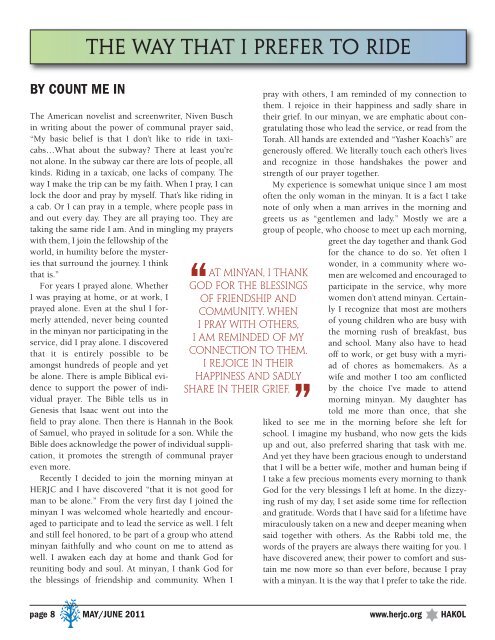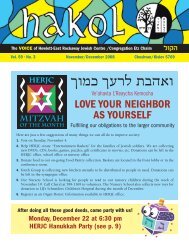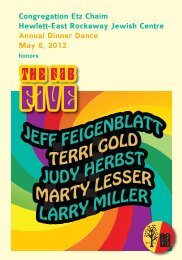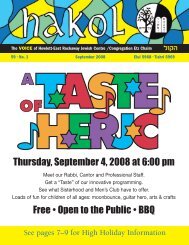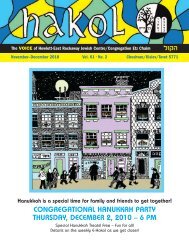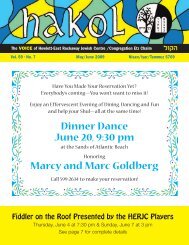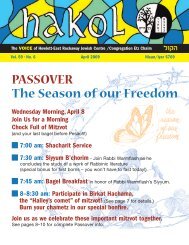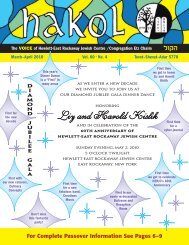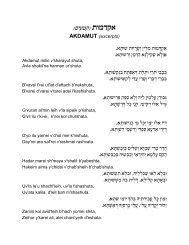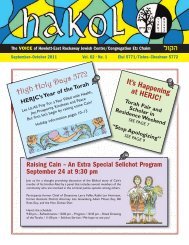Laurie & Joe Brofsky - Hewlett E. Rockaway Jewish Center
Laurie & Joe Brofsky - Hewlett E. Rockaway Jewish Center
Laurie & Joe Brofsky - Hewlett E. Rockaway Jewish Center
Create successful ePaper yourself
Turn your PDF publications into a flip-book with our unique Google optimized e-Paper software.
BY COUNT ME IN<br />
the way that I prefer to ride<br />
The American novelist and screenwriter, Niven Busch<br />
in writing about the power of communal prayer said,<br />
“My basic belief is that I don’t like to ride in taxicabs…What<br />
about the subway There at least you’re<br />
not alone. In the subway car there are lots of people, all<br />
kinds. Riding in a taxicab, one lacks of company. The<br />
way I make the trip can be my faith. When I pray, I can<br />
lock the door and pray by myself. That’s like riding in<br />
a cab. Or I can pray in a temple, where people pass in<br />
and out every day. They are all praying too. They are<br />
taking the same ride I am. And in mingling my prayers<br />
with them, I join the fellowship of the<br />
world, in humility before the mysteries<br />
that surround the journey. I think<br />
that is.”<br />
For years I prayed alone. Whether<br />
I was praying at home, or at work, I<br />
prayed alone. Even at the shul I formerly<br />
attended, never being counted<br />
in the minyan nor participating in the<br />
service, did I pray alone. I discovered<br />
that it is entirely possible to be<br />
amongst hundreds of people and yet<br />
be alone. There is ample Biblical evidence<br />
to support the power of individual<br />
prayer. The Bible tells us in<br />
Genesis that Isaac went out into the<br />
field to pray alone. Then there is Hannah in the Book<br />
of Samuel, who prayed in solitude for a son. While the<br />
Bible does acknowledge the power of individual supplication,<br />
it promotes the strength of communal prayer<br />
even more.<br />
Recently I decided to join the morning minyan at<br />
HERJC and I have discovered “that it is not good for<br />
man to be alone.” From the very first day I joined the<br />
minyan I was welcomed whole heartedly and encouraged<br />
to participate and to lead the service as well. I felt<br />
and still feel honored, to be part of a group who attend<br />
minyan faithfully and who count on me to attend as<br />
well. I awaken each day at home and thank God for<br />
reuniting body and soul. At minyan, I thank God for<br />
the blessings of friendship and community. When I<br />
“At minyan, I thank<br />
God for the blessings<br />
of friendship and<br />
community. When<br />
I pray with others,<br />
I am reminded of my<br />
connection to them.<br />
I rejoice in their<br />
happiness and sadly<br />
share in their grief.<br />
”<br />
pray with others, I am reminded of my connection to<br />
them. I rejoice in their happiness and sadly share in<br />
their grief. In our minyan, we are emphatic about congratulating<br />
those who lead the service, or read from the<br />
Torah. All hands are extended and “Yasher Koach’s” are<br />
generously offered. We literally touch each other’s lives<br />
and recognize in those handshakes the power and<br />
strength of our prayer together.<br />
My experience is somewhat unique since I am most<br />
often the only woman in the minyan. It is a fact I take<br />
note of only when a man arrives in the morning and<br />
greets us as “gentlemen and lady.” Mostly we are a<br />
group of people, who choose to meet up each morning,<br />
greet the day together and thank God<br />
for the chance to do so. Yet often I<br />
won der, in a community where wo -<br />
men are welcomed and encouraged to<br />
participate in the service, why more<br />
women don’t attend minyan. Cer tain -<br />
ly I recognize that most are mothers<br />
of young children who are busy with<br />
the morning rush of breakfast, bus<br />
and school. Many also have to head<br />
off to work, or get busy with a myriad<br />
of chores as homemakers. As a<br />
wife and mother I too am conflicted<br />
by the choice I’ve made to at tend<br />
morning minyan. My daughter has<br />
told me more than once, that she<br />
liked to see me in the morning before she left for<br />
school. I imagine my husband, who now gets the kids<br />
up and out, also preferred sharing that task with me.<br />
And yet they have been gracious enough to understand<br />
that I will be a better wife, mother and human being if<br />
I take a few precious moments every morning to thank<br />
God for the very blessings I left at home. In the dizzying<br />
rush of my day, I set aside some time for reflection<br />
and gratitude. Words that I have said for a lifetime have<br />
miraculously taken on a new and deeper meaning when<br />
said together with others. As the Rabbi told me, the<br />
words of the prayers are always there waiting for you. I<br />
have discovered anew, their power to comfort and sustain<br />
me now more so than ever before, because I pray<br />
with a minyan. It is the way that I prefer to take the ride.<br />
page 8 MAY/JUNE 2011<br />
www.herjc.org<br />
HAKOL


